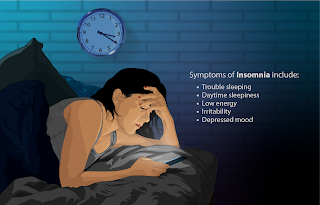As someone who has been teaching yoga for
quite a long time, I am often asked this question: Does yoga, along with deep
breathing or mindfulness meditation, helps patients suffering from sleeping
disorders or severe insomnia? My answer is always "Yes." Insomnia is
a condition that often arises as a symptom of other physical or psychological
ailments or disorders. Once the root cause is identified and proper treatment
is administered, insomnia can often vanish on its own.
I have always believed that insomnia can be
improved—and ultimately cured—with short-term medication (in chronic cases) and
through mindfulness meditation and specific yogic asanas that promote sleep and
relaxation. This curiosity and concern have led me to dive deeper into this
serious and alarming problem, which may become a widespread issue among young
adults in the days to come. Let’s start by understanding what insomnia is. What
are its common symptoms? What physical and psychological ailments might trigger
it? What tests should be conducted to identify these problems? Finally, what
are the possible solutions, including pharmacological treatments and yogic
interventions?
I also aim to explore the effects of
mindfulness meditation in addressing this issue, supported by evidence
collected from various research articles.
What Is Insomnia?
Insomnia is the most common sleep disorder.
It disrupts a person’s life and work, increases the risk of various health
issues, and often requires long-term intervention. The financial burden and
inconvenience discourage patients from adhering to treatments, which can lead
to chronic insomnia.
According to the World Health Organization
(WHO), insomnia is defined as a problem initiating or maintaining sleep, or the
complaint of non-restorative sleep that occurs on at least three nights a week
and is associated with daytime distress or impairment. Definitions focused on
sleep symptoms typically describe insomnia as difficulty initiating sleep,
difficulty maintaining sleep, early awakenings, or sleep that is
non-restorative or generally of poor quality.
Common Symptoms
Insomnia affects both nights and days. It
often involves trouble falling asleep, staying asleep, or waking up too early,
leaving individuals feeling tired and refreshed. This lack of quality sleep
leads to daytime problems like:
Fatigue
Trouble focusing
Irritability
Low energy
Insomnia can also cause physical issues such
as headaches, weakened immunity, and digestive problems. Some people develop
anxiety about sleep or rely on sleep aids, which may worsen the condition.
Overall, insomnia significantly impacts health and well-being, creating
challenges that are difficult to overcome.
What Causes Insomnia?
Experts do not fully understand why insomnia
occurs, but it is believed to result from a combination of factors. These
include biological, psychological, and lifestyle influences.
Possible Causes:
Genetics: Sleep patterns and conditions like insomnia
often run in families.
Brain Chemistry: Differences in brain activity or overactive
brain function can interfere with sleep.
Medical Conditions: Temporary illnesses, chronic issues like
acid reflux or Parkinson’s disease, or circadian rhythm disruptions often
affect sleep quality.
Mental Health: About half of those experiencing chronic
insomnia also deal with anxiety or depression.
Stress and Life Events: Stressful life changes, such as moving or
adjusting to a new work schedule, can disrupt sleep.
Lifestyle Habits: Irregular schedules, excessive naps, or
caffeine consumption can exacerbate insomnia.
Insomnia is a complex condition influenced by
a unique interplay of these factors, making it different for each individual
(Cleveland Clinic, 2024).
Probable
Solutions
Pharmacological Treatments
Medications are a common initial treatment
for insomnia and can help temporarily. However, their benefits often fade once
the drugs are stopped, leading to challenges such as poor daytime functioning
and the risk of addiction (Daley, Morin, LeBlanc, Gregoire, & Savard, 2009).
Non-Drug
Approaches
Cognitive Behavioral Therapy (CBT): CBT is a widely used method to adjust sleep
routines and change thoughts and beliefs about sleep.
Sleep Hygiene: Teaching good sleep habits aims to improve
behaviors and environments that disrupt sleep.
Mindfulness-Based
Interventions (MBIs)
The Role of Mindfulness and Ayurveda
Mindfulness-based interventions have gained
attention as effective non-drug treatments for insomnia. Ayurveda, the ancient
Indian health system, emphasizes the importance of sleep as a natural gift
essential for health and harmony. Disruptions to sleep patterns caused by
stress or an overactive mind can lead to health problems. Modern science agrees
that sleep is vital for repairing and restoring the body and mind.
How Yoga Helps
Yoga has been shown to reduce stress, improve
physical health, and boost mental well-being. It alleviates negative emotions
like anxiety and depression while increasing energy and positivity. Although
research on yoga’s direct impact on insomnia is ongoing, its benefits for
relaxation and stress management make it a promising natural remedy.
Yoga Nidra: A Deeper Solution
Yoga Nidra, or "yogic sleep," is a
guided relaxation technique that induces deep rest while maintaining mental
awareness. This state between sleep and wakefulness helps the mind and body
deeply relax. Studies show that Yoga Nidra effectively reduces anxiety, stress,
and insomnia. It has also been beneficial for managing conditions like high
blood pressure, heart problems, and asthma (Kumar, 2008).
For example, research on students found that
Yoga Nidra significantly reduced their stress levels and improved focus and
memory (Pitt, Oprescu, Tapia, & Gray, 2018). While it is highly effective for mild to
moderate stress, its impact may be limited for extreme stress.
Conclusion
Insomnia is a challenging condition, but it
is not insurmountable. By combining mindfulness meditation, specific yogic
asanas, and therapeutic interventions like Yoga Nidra, individuals can find
relief and reclaim restful sleep. The path to better sleep begins with
understanding the root causes and embracing holistic practices that nurture
both the body and mind.
I have been trying this method of Yoga Nidra
and mindfulness meditation with my clients, and their feedback has been truly
motivating. Their stories of transformation inspire me to continue sharing
these techniques. If you are struggling with sleep-related problems, I highly
encourage you to explore these practices. Remember, you are not alone on this
journey. Should you need any guidance or support, feel free to reach out to me
through Namahyog Institute. Together, we can work towards a peaceful
and restorative night's sleep.
References
Cleveland Clinic. (n.d.). Insomnia.
Retrieved December 17, 2024, from https://my.clevelandclinic.org/health/diseases/12119-insomnia
Daley, M., Morin, C. M., LeBlanc, M., Grégoire, J. P., & Savard, J. (2009). The economic burden of insomnia symptoms and good sleepers. Sleep, 32(1), 55–64.
https://pubmed.ncbi.nlm.nih.gov/19189779
Kumar, K. (2008). A study on the impact on stress and anxiety through Yoga Nidra. Indian Journal of Traditional Knowledge, 7(3), 401–404. https://www.researchgate.net/publication/215448826_A_study_on_the_impact_on_stress_and_anxiety_through_Yoga_nidra
Pitt, A., Oprescu, F., Tapia, G., &
Gray, M. (2018). An exploratory study of students’ weekly stress levels and
sources of stress during the semester. Active Learning in Higher Education,
19(1), 61–75. https://doi.org/10.1177/1469787417731194











0 Comments